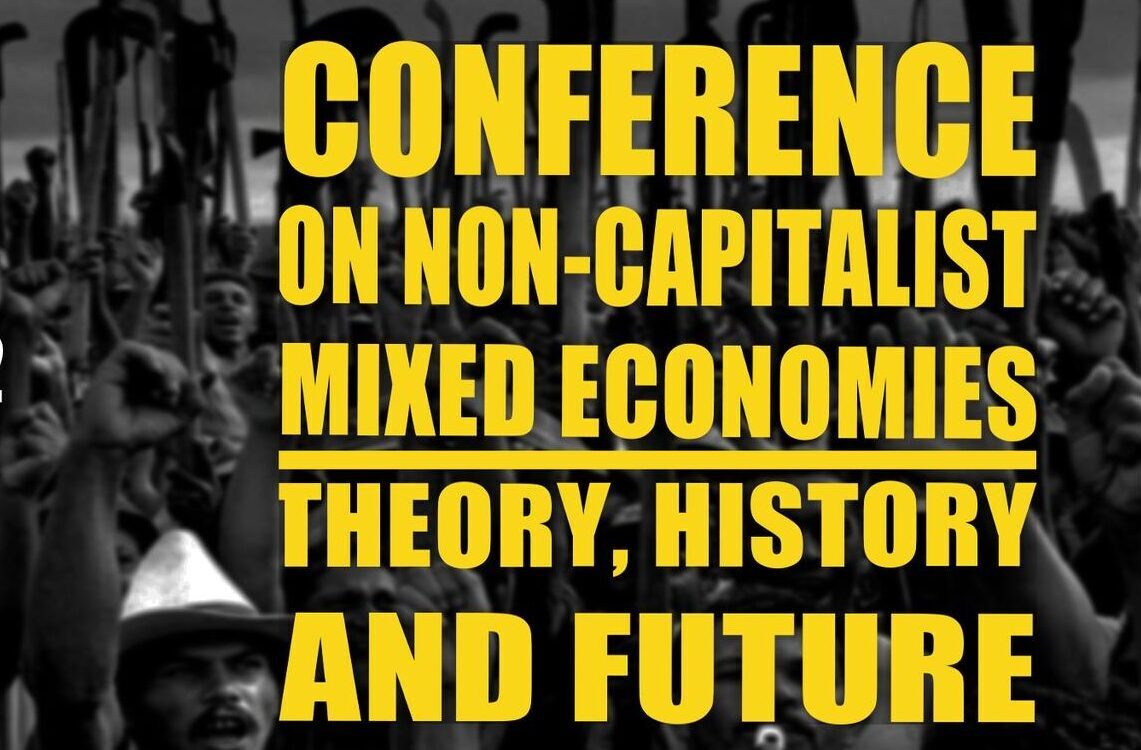For ENGLISH scroll down ⬇️
Na konferenci se budou diskutovat různé formy nekapitalistického vlastnictví, ekonomické směny a jejich společného vztahu. Cílem je objasnit, jaké konkrétní formy vlastnictví stály či stojí za státními podniky, útvary ve samosprávě pracujících, družstvy, sociálními ekonomikami nebo ekonomikami domácností. Jejich vzájemný vztah a jejich vztah k nekapitalistickému trhu. Podíváme se na to, jak fungují minulé i současné trhy pod větší státní regulací nebo politikou cenové kontroly, jak probíhá ekonomická směna bez kapitálu a jak operují trhy s pozemky v moderních nekapitalistických ekonomikách, které považujeme za velmi důležité, mimo jiné, v Číně, Vietnamu, východoevropských ekonomikách 60.-80. let, na Kubě a v Mosambiku. Rádi bychom se také podívali na to, s jakými hlavními problémy se potýkají nekapitalistické struktury v kapitalistickém prostředí v Mexiku (zapatistické komunity), Brazílii (hnutí dělníků bez půdy), Argentině (hnutí „Okupované továrny“) atd. Budeme zkoumat procesy tvorby cen, financování, investic, organizování výroby a vazby na další formy ekonomické činnosti a vlastnictví. Do této problematiky zahrneme také studie agrárních a neagrárních příkladů a jejich výsledků napříč historii. Pracovním jazykem bude angličtina.
Konference bude vedená v hybridní online/offline formě, pro online účast se prosím předem registrujte na: www.bit.ly/3Ejy2cY
—–
This year’s conference is focused on discussing different forms of non-capitalist ownership and economic exchange and their interrelationships. Our aim is to clarify what exact forms of ownership were or are behind state-owned companies, worker-managed enterprises, cooperatives, household economies, and social economies, as well as how they relate to each other and to non-capitalist exchange (referred to here also as non-capitalist markets). The relationship to capitalist markets has been much discussed, but now we need to see how historically or currently existing markets under greater state regulation, markets under price control policies, economic exchange without capital and land markets operating in modern non-capitalist economies, which we view as very important in China, Vietnam, 1960s-1980s East European economies, Cuba, and Mozambique, among others. We would also like to look at what major problems non-capitalist forms face in a capitalist environments, such as in Mexico (for the example, the Zapatista communities), Brazil (for example, the Landless Workers Movement), Argentina (for instance, the „Occupied factories“ movement) etc. Very importantly, we need to study the processes of price formation, financing, investment, production organization, land markets and links to other forms of economic activity and ownership. As part of this, we wish to include the study of agrarian and non-agrarian examples and their historical outcomes.
The conference will be held in a hybrid fashion, registration required for online participation on: www.bit.ly/3Ejy2cY
PROGRAMME:
FRIDAY 25 NOVEMBER 2022
18:00 Shift Change (2012): Film screening and discussion with Attila Melegh and Ágnes Gagyi
SATURDAY 26 NOVEMBER 2022
11:40 Opening statements: Joanna Gwiazdecka (Rosa Luxemburg Stiftung), Attila Melegh (Karl Polanyi Research Center for Global Social Studies)
12:00 Keynote: Salvatore Engel-Di Mauro (online) Socialist state economies and environmental impact
12:30 – 13:20: Lunch break
13:20 Session 1: Historical and theoretical problems of transition to socialisms
Keith Hart: Marcel Mauss’s thoughts and actions concerning socialism and money
Raquel Varela: Ideas of a socialist transition during the Portuguese revolution
David Lane: Is contemporary China ‚state capitalist‘?
Pietro Basso: Socialism and transition to socialism in Western countries according to Amadeo Bordiga
Roberto della Santa: From the ‚Novy Byt‘ (1923) to a ‚new way of life‘ (2023): toward non- homogeneous social forms in troubled times
Chair: Márton Czirfusz
16:15 Session 2: Financing, accounting and money in non-capitalist economies
Radhika Desai: Money in socialist economies
Alan Freeman: Socialism and national accounting system
Fikadu T. Ayanie: Garrison Socialism ‘from above’: The Ethiopian experiment in the context of non-capitalist mixed economy
Bruno De Conti (online): Money and finance in China: tensions arising from the public-private dimensions
Johanna Bockman (online): Polanyi’s ‚socialist accounting‘
Chair: Enikő Vincze
SUNDAY 27 NOVEMBER
13:00 Session 3: Land markets, and other markets in non-capitalist economies
Zhun Xu (online): The rural land question in China
Zhaochang Peng (online): Rural mixed economy in Marx’s Capital and ancient China
Tamás Gerőcs and Linda Szabó: Semi-peripheral infrastructure development during global power shift. China’s mixed-economic paradigm for investing in Hungary
Chair: Fikadu T. Ayanie
15:00 Session 4: Markets and society in socialisms
Tamás Krausz: Transition societies and ownership
Attila Antal: What have neoliberals learned from the Kádár regime? Anti-capitalism and state planning in the mixed economy
Enikő Vincze: The mixed housing order in Romanian state socialism
Attila Melegh: Ideas of mixed economy and socialism: How complexity was reduced?
Chair: András Vigvári
Key Organizers: Karl Polanyi Research Center for Global Social Studies, College for Advanced Studies in Social Theory, Eszmélet JournalPartner Organizations: Fordulat Journal, Geopolitical Economy Research Group,
Institute of Political History Social Theory Research Group, International Karl Polanyi
Society, LeftEast, Living and Working Conditions Observatory, Periféria Policy and
Research Center, Solidarity Economy Center, Transform! Europe, Working Group for
Public Sociology “Helyzet”
